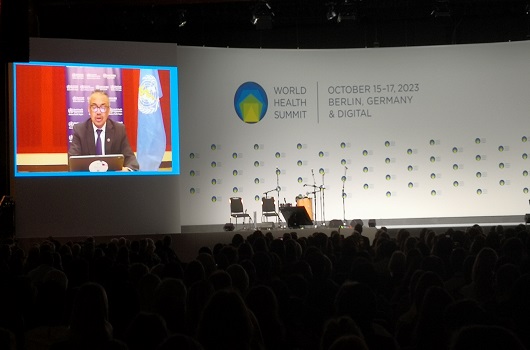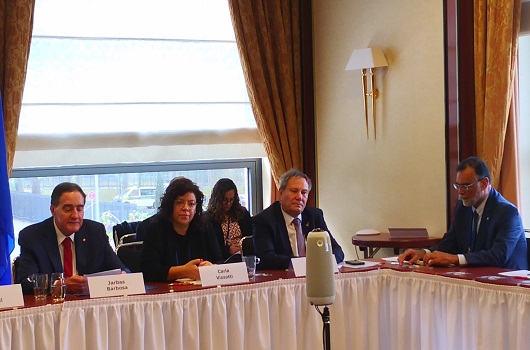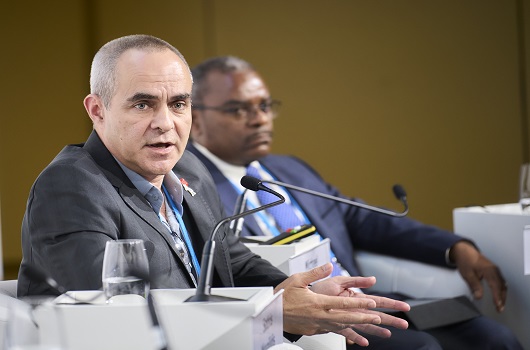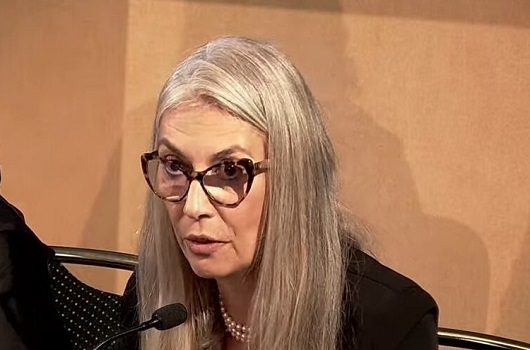Fiocruz has a prominent participation in the World Health Summit in Berlin
24/10/2023
Oswaldo Cruz Foundation
International cooperation in tackling the effects of climate change, pandemic preparedness, disease eradication and universal access to medical care were some of the topics addressed at the World Health Summit 2023, which from the 15th to the 17th of this month gathered around 3,500 representatives from the field, from all over the world in Berlin, in an event in which Fiocruz played an active role. In panels, workshops and bilateral meetings, the Foundation shared not only the experience of successful actions in Brazil, but also the difficulties encountered and proposals for resolving them.
The WHO director-general, Tedros Adhanom, commented on the lessons learned from COVID-19 on the opening ceremony (photo: reproduction)
With the theme A defining year for global health action, the Summit brought together authorities, global leaders and representatives of the private sector and civil society. At the opening ceremony (10/15), the director-general of the World Health Organization (WHO), Tedros Adhanom, commented on the lessons learned from COVID-19 and highlighted that negotiations for a global agreement on pandemics must move faster so that the text is ready by the 2024 General Assembly: "We are stronger together, which is why multilateralism is so important", he said.
Reducing dependence on the region
In this context, the president of Fiocruz, Mario Moreira, participated on Sunday (19/15) in a meeting at which the Pan American Health Organization (PAHO) presented its Elimination Initiative, which aims to eradicate more than 30 communicable diseases – such as malaria, cervical cancer and the Chagas disease – in the Americas by 2030. According to the director of PAHO, Jarbas Barbosa, it must be ensured that the countries of the region have access to tools and innovations in health, in addition to the organization's revolving funds. "Ensuring access to a wide range of vaccines, diagnostics, medicines and emerging technologies will be an important factor in preventing communicable diseases", he explained.
Mario Moreira participated in a meeting at which PAHO presented its Elimination Initiative, which aims to eradicate more than 30 communicable diseases (photo: WHS 2023)
At the meeting, which was attended by representatives from the Brazilian and Argentine Ministries of Health, Moreira highlighted the importance of connecting PAHO's Elimination Initiative to the local industry focused on the production of health inputs, thus reducing dependence on the region. "The initiative could be articulated with this industry so that we have some kind of autonomy in production", he said.
The president of Fiocruz also highlighted the positive impact of joint actions: "By working together, we can produce much more results".

Sotiris Missailidis highlighted that it is necessary to expand the research capabilities of developing countries to avoid technological dependence (photo: CEPI)
In the same line, the deputy director of Innovation of the Institute of Technology on Immunobiologicals (Bio-Manguinhos/Fiocruz), Sotiris Missailidis, participated, on the last day of the event (10/17), in the panel organized by the Coalition for Epidemic Preparedness Innovations (Cepi), which discussed the importance of partnerships and investments to establish a synchronized, rapid and equitable global response to future viral threats. Missailidis emphasized that, in addition to production, it is necessary to expand "the research capacities of developing countries. Otherwise, we will always depend on technology transfer, which may or may not happen, and on the prices charged by the big pharmaceutical companies. So, manufacturing is important, but there must be a strong concern for the R&D component", he said.
Unique Health Education and the Cidacs on the spotlight
At the workshop Tackling the One Sustainable Health challenges by tackling health, environmental and social issues together, organized by The Lancet One Health Commission and the One Sustainable Health Forum, on Tuesday (10/17), the vice president of Research and Biological Collections (VPPCB) of Fiocruz, Maria de Lourdes Oliveira, was widely applauded when she commented that deforestation in the Amazon had fallen 48% from January to August this year with actions taken by the new government. Maria de Lourdes emphasized that science has regained its leading role in the country.
Maria de Lourdes Oliveira mentioned that Fiocruz had launched One Health courses at the postgraduate level (photo: Internet reproduction)
"We cannot talk about social, environmental or economic development without science as a basis. This requires a multidisciplinary approach", she said. The vice president said that Fiocruz has launched One Health courses at the postgraduate level, in addition to having a Translational Research Program, "with all teams working together to obtain a real diagnosis and form holistic solution proposals. The current scenario requires robust preparation and an immediate response", she added.
Even in sessions where members of the Foundation were not at the table, Fiocruz was mentioned. On the panel Sustainable health for people and the planet, on the last day of the event, Fiocruz Bahia's Center for Data and Knowledge Integration for Health (Cidacs) was mentioned as an example of an initiative that helps combat misinformation by bringing quality data to the public. In a discussion on ways to connect the population to policymakers so that their needs are considered and met, the director of Climate and Health at the Wellcome Trust, Alan Dangour, cited the work of Cidacs, especially the Cohort of 100 Million Brazilian.
Dangour added that Wellcome Trust will support the inclusion of climate variants in the study. "It is a very interesting study because of its scale and its direct link to the Ministry [of Health] and the government, so that there is a direct path from the evidence to the decision-makers", he said. Ethel Maciel, secretary for Health and Environmental Surveillance at the Ministry of Health, added that "Cidacs is a good example of a very important Brazilian government institution, Fiocruz".
Read more: Fiocruz begins pandemic intelligence work in partnership with WHO


